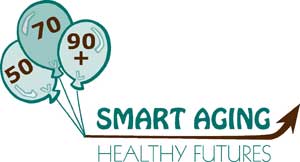Smart Aging: Healthy Futures
 Fifty-two percent of older Mississippians live in rural areas, and over eighty percent of elderly Mississippians live in their own family dwellings. The challenge for Mississippi is finding ways to maintain and improve the health of our senior residents while ensuring them the freedom of residing in their own homes. This is especially true for rural areas with less formal support for seniors’ health and well being.
Fifty-two percent of older Mississippians live in rural areas, and over eighty percent of elderly Mississippians live in their own family dwellings. The challenge for Mississippi is finding ways to maintain and improve the health of our senior residents while ensuring them the freedom of residing in their own homes. This is especially true for rural areas with less formal support for seniors’ health and well being.
Based upon that need, the Smart Aging: Healthy Futures project was developed by Mississippi State University Extension Service, with funding from the United States Department of Agriculture, to help communities foster the healthy aging of their senior populations.
The project has three primary objectives:
- To identify specific community resources and deficits relative to supporting the health and health care needs of a community’s rural senior population
- To engage communities in grassroots efforts to improve the health and health care accessibility of their rural senior populations
- To initiate various health promotion activities and educational programs targeting rural aging populations within communities and their families and support systems
The project was originally conducted in Oktibbeha, Clay, Copiah and Lincoln Counties. In Copiah and Lincoln counties, the project was directed in cooperation with Copiah – Lincoln Community College. Early successes led to the project being expanded to include the city of Pascagoula. Findings of and materials produced for the project are here to assist other communities and seniors throughout the state as we all work towards the goal of achieving a healthy future.
Publications
News
The holidays are here! With all the activity, it's easy to skip your daily exercise. But these tips can help keep you active.
Incorporating healthier eating habits into your daily routine can help prevent and manage diabetes by helping you maintain healthy blood sugar levels. Check out these tips to help you get started.
STARKVILLE, Miss. -- As the holidays approach, consider three ways to share the joys of the season by supporting local food pantries. Gifts of money, time and food items are all welcome.
Success Stories
In Rolling Fork, the Mississippi town in Sharkey County devastated by a twister on March 24, 2023, despair was not an option.
You don’t have to have diabetes to benefit from the principles of the Dining with Diabetes (DWD) program.
Dining with Diabetes covers healthy eating, physical activity, disease monitoring, medication compliance, and risk reduction, and the course empowers participants by giving them access to nutrition knowledge and resources for food preparation. Classes include research-based education, cooking demonstrations, and healthy recipe tasting. These tools can help people make positive changes by planning menus, counting carbohydrates, controlling portions, and reading labels.








